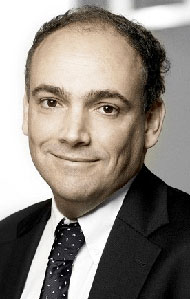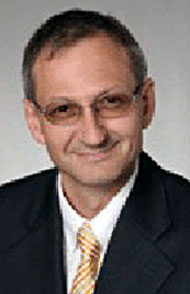 “We
want your cargo” is the slogan of an international campaign now
launched by Damco. “We
want your cargo” is the slogan of an international campaign now
launched by Damco.
The Danish forwarding agent, a subsidiary
of logistics and shipping giant A.P. Moller-Maersk, is highly ambitious
to push its global air freight business ahead.
The company’s CEO, Rolf Habben Jansen
(RHJ), below right, together with Damco’s VP Cargo, Remo Eigenmann
(RE), below left, gave Air Cargo News FlyingTypers this exclusive
interview.
ACNFT: Rolf,
what’s behind this “we want your cargo” campaign?
 RHJ:
That’s
only half of the sentence; the full message reads, “We want your
cargo because we want to help reduce it.” Best way of doing this
is to offer shippers a menu of different and attractive transport options
that create value for them. This is the idea we are actually pushing ahead.
Since we are very experienced in managing the entire supply chain from
door to door, we can help lower logistics and transportation costs substantially,
reduce inventories and increase the turnover of assets, just to name some
advantages we offer our clients. RHJ:
That’s
only half of the sentence; the full message reads, “We want your
cargo because we want to help reduce it.” Best way of doing this
is to offer shippers a menu of different and attractive transport options
that create value for them. This is the idea we are actually pushing ahead.
Since we are very experienced in managing the entire supply chain from
door to door, we can help lower logistics and transportation costs substantially,
reduce inventories and increase the turnover of assets, just to name some
advantages we offer our clients.
ACNFT: Why
haven’t you pushed the air freight biz much before?
RHJ: You
are right; our cargo business was somehow underdeveloped as shown by the
roughly 60,000 tons being handled internationally last year. Comparing
this segment with the contribution of our enterprise’s other service
offerings, this portion seems fairly small. So our management team sat
down and decided, in accordance with our parent company, A.P. Moller-Maersk,
to fill this gap as quickly as possible by aggressively upping our market
share.
First visible result is the average tonnage growth
of 30 percent from January until the end of September 2010. This means
that we will handle an estimated total of 80,000 tons this year. Our ambitions,
however, go much further. By 2014, we aim an annual throughput of roughly
300,000 tons, placing us among the worldwide leading twenty air freight
agents.
ACNFT: You
want to achieve this by growing organically or acquiring local agents?
RHJ: Our
main focus is laid on organic growth but we are also looking beyond our
fence, of course. If there are local companies that give us additional
capabilities and add to our market share, we might purchase them if we
see a fit. This could happen in Australia, for example, where we still
are fairly unknown, but also in the central and western parts of China
since things develop there quite fast.
 ACNFT: Does
Damco have a unique selling point that differentiates your company from
competitors? ACNFT: Does
Damco have a unique selling point that differentiates your company from
competitors?
RE: One such USP is our sea/air business concept that offers our clients
highly competitive and cost efficient alternatives to the traditional
15 to 18 days required transporting via Dubai or other transfer points
from boat to plane somewhere in the Emirates.
For example, we can feed cargo by short sea shipping
from Hong Kong, Shanghai, Incheon, and other ports in the Far East into
our Malaysian hub, Tanjung Pelepas. There, we consolidate the goods, transfer
them to Kuala Lumpur or Singapore and fly them out to Europe. This way,
the entire journey of the shipments takes 12 days on average, which we
consider an attractive option to Dubai or Sharjah. It is also an alternative
to sending goods directly from the Far East to Europe by plane. This illustrates
the second part of our slogan, “we want to reduce your cargo.”
ACNFT: Is
Damco profitable or losing money?
RHJ: We
will be profitable for the very first time in 2010. We consider this year
a fundamental turning point for our company.
ACNFT: Which
product lines do you expect to foster your growth in cargo specifically?
RHJ: We
are traditionally strong in retail and apparel. Besides the short-sea
segment that is very complementary to our parent, Maersk’s, shipping
line’s ocean freight transports, we believe that relevant growth
in air freight can be contributed by government and defense orders.
ACNFT: You
mentioned Maersk. Do they offer their subsidiary Damco any favorable conditions
for carrying sea/air goods?
RHJ: Negative.
We don’t have better access to their ocean fleet’s capacity.
They do their biz and we concentrate on ours. However, we capitalize in
some way from the positive image and their strong brand name. Behind us
stands a mighty group and that’s good to know.
Damco Quick
Employees: 10,500 globally
Customers: 10,000 globally
Offices: 280+ globally
Net revenue 2009 (in 1000 USD): $ 2,000,000
Ebit 2009 (in 1000 USD): 45,300
|
Volumes split
per activity (2009):
• Ocean freight - total
volumes (in TEUs): 545,000
• Air freight (in tons):
60,000
• Supply chain mgmt
- total (in 1000 cbm): 45,000
• Reefer logistics -
total (in FFEs): 70,000 |
Logistics services offered:
•Ocean and air freight,
trucking, documentation, cargo projects
•Supply chain mgmt
• Reefer logistics
• Warehousing and distribution
• Consultancy services
|
ACNFT: Have
you got preferred capacity providers you collaborate with or is the rate
all that counts?
RE: We
work with a limited set of renowned key airlines like Emirates, Etihad,
Lufthansa Cargo, Cargolux and Air France-KLM Cargo. Interestingly enough,
some carriers are obviously eager to go on a longer journey with us by
offering block space agreements. This we appreciate very much and it obviously
shows that we are becoming increasingly attractive for the main capacity
providers.
Heiner Siegmund |





